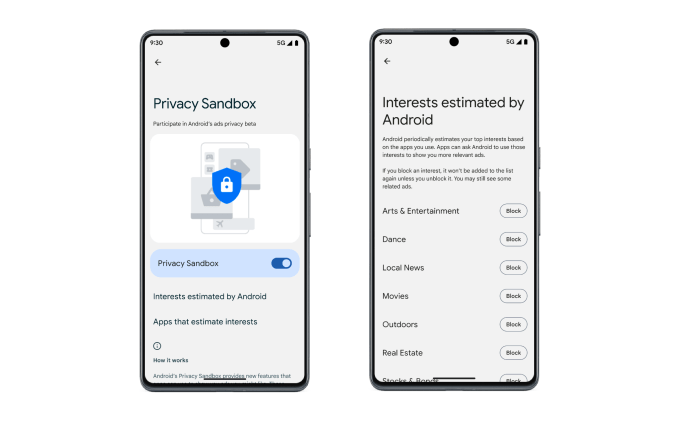Google has begun letting Android developers kick the tyres of its claimed reboot of ad-targeting — announcing the launch of the first Beta for its “Privacy Sandbox”, an adtech stack proposal which aims to iterate how ad tracking, targeting and reporting is done so it appears less creepy for individual users while maintaining an interest-based, behavioral targeting capability on web users’ eyeballs.
A “small percentage” of eligible Android 13 devices will be enrolled in the trial of the beta from today as the adtech giant starts a gradual (but it says global) rollout of the beta — which will “expand over time”. (It’s published developer guidance on participating in the beta here.)
Ad partners for the trial include TechCrunch’s parent Yahoo, mobile games maker Rovio, mobility firm Wolt, cross-platform games engine Unity and mobile marketing platforms AppsFlyer, InMobi Exchange and Adjust.
“If your device is selected for the Beta, you’ll receive an Android notification letting you know,” Google adds in a blog post — implying Android users will be opted in to the experimental, interest-based ad targeting (and will have to actively opt out if they don’t wish their eyeballs to be guinea pigs).
Asked for a confirm on this opt in point, Google said that Android users in the European Economic Area, Switzerland, and the U.K. will be asked to voluntarily participate in the program — by way of opt in.
That suggests, elsewhere in the world, users are being opted in — and will therefore have to manually opt themselves out if they don’t want to be involved in these interest-based ads tests.
Back in 2019, when Google announced the so-called “Privacy Sandbox” proposal to make ad-tracking less awful for individual web users’ privacy (or, well, to make its business less of a target for the privacy backlash) — it focused on its desktop-based Chrome-browser, and on deprecating third party tracking cookies on the web. But a year ago it announced its intention to expand the Sandbox approach to Android — and, today, it’s letting the first Android developers have a play with (and provide feedback on) what it’s built.
“The Privacy Sandbox Beta provides new APIs that are designed with privacy at the core, and don’t use identifiers that can track your activity across apps and websites. Apps that choose to participate in the Beta can use these APIs to show you relevant ads and measure their effectiveness,” explains Google’s Anthony Chavez, in the blog post.
It’s not clear exactly how many Android users will be exposed to the experimental ad-targeting. Or where in the world these users will be. Or what proportion will be asked for their affirmative consent to be in the trial — vs being opted in and having to opt themselves out via the settings if they don’t wish to participate.
Chavez’s blog post only specifies that Android users can “control” their “Beta participation” by going to the Privacy Sandbox section of Settings — where he says the screen will let users “see and manage” the ad interests that participating apps can use to show them “relevant ads”, as he terms the tracking-based marketing.
“For example, you could see that Android has estimated that you’re interested in topics like Movies or Outdoors, and you can block any topics if they don’t fit your interests,” he writes, adding: “And if you change your mind about participating in the Beta, you can turn it off or back on in Settings.”

Image Credits: Google
Android users who delve into these settings and find they’ve been assigned “topics” that they do not hold may have reason to question Google’s approach with the inferred interest-based ad targeting.
Hopefully there will be no worse shocks than that — since Google has said the Topics taxonomy will be “human curated” — exactly to avoid the inclusion of “sensitive” topics as “estimated interests”.
However the ease with proxies can be identified for sensitive topics (a certain type of TV show as a stand in for political views, say) suggests that might be rather naive. And users may want to consider whether their generated interests could be viewable to someone else who has access to their device — which could create privacy risks depending on what they use their device for.
Google’s blog post doesn’t dwell on these kinds of sensitive privacy considerations.
Instead, the company opts to take a swipe at mobile platform rival Apple’s App Tracking Transparency (ATT) feature — which requires third party developers on iOS to ask users for their consent to in-app tracking — with Chavez couching ATT as a “blunt” approach and linking to a study carried out by a third party tracker blocker that claims ATT does not actually stop tracking and thus just gives users a “false sense of privacy”.
Chavez’s blog post further claims Apple’s way will lead to increased tracking of users, via the likes of device fingerprinting, while also harming developers’ ability to generate ad revenue — so Google is clearly aiming to position its technical reworking of ad-tracking as a more nuanced tool. One which avoids binary choices — like asking people up-front if they want to be tracked or not.
Instead, for the majority of Android users, Google will be burying options to disable tracking in multi-layered settings menus — which further fuzz the choice by suggesting the users could just trim how much tracking they’re comfortable with and thereby let the behavioral targeting carry on (and spawn new estimated interests when they’re not looking).
The Sandbox pitch Google has been honing over these years of development has coagulated and clotted around a claim that its evolved adtech stack will grant users “more privacy” (as defined by Google — so definitely not total privacy) while letting the ad-tracking industry gravy train generating revenues but keeping it locked to Google’s ‘evolved’ infrastructure; one which takes more of the tracking components in-house as tracking cookies get crushed (so, well, in more of a Google-dependent bind than ever).
Put politely, it’s a compromise offer for both sides — which, ultimately, may not please either end. A lose-lose if you will. But Google evidently believes the gamble is worth it because if can pull it off this rebranding of tracking ads, getting the Sandbox to pass muster with privacy and competition regulators and the advertisers who complained to them, it gets the really big win of remaining the winning adtech middleman with the lion’s share of the behavioral ad dollars flowing into its coffers…
